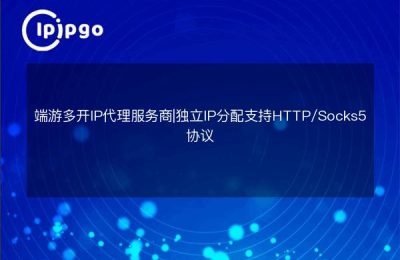
Why do you need to pinpoint overseas IP addresses?
In multinational business scenarios, many users need country-specific IPs to fulfill compliance requirements or complete specific operations. For example, cross-border e-commerce needs to detect product display pages in different regions, social media operations need to match the country of target users, and market research needs to obtain real local data - all of these need to beReal, stable, verifiable geolocationof the proxy IP.
Taking ipipgo as an example, its residential IP library covering core markets such as the U.S., Japan, and Germany can simulate a real home network environment. For example, when a user needs to get promotional information about a local Japanese superstore, using a local residential IP to access the site can avoid being intercepted by the anti-crawl mechanism and ensure that they see content that is identical to that of local residents.
Choosing the right type of agent is key
For different usage scenarios, ipipgo provides two precise positioning solutions:
| typology | Applicable Scenarios | Core Advantages |
|---|---|---|
| Static Residential IP | Long-term fixed operations (e.g., store management, account maintenance) |
Continuous online for 72 hours on the same IP Geo-targeting to the city level |
| Dynamic Residential IP | High Frequency Data Acquisition (e.g., price monitoring, public opinion analysis) |
New IP per request Supports 10 rotations per second |
Especially in countries like Germany, where privacy is strictly protected, it is recommended to choose residential IPs over data center IPs. ipipgo's German IP pool is generated through local home broadband dial-up, and the IP address segments have been filed with local ISPs to avoid triggering website security verification.
Three real-world application scenarios
Scenario 1: U.S. Localization Testing
Login to Walmart's official website using ipipgo US residential IP to verify actual item prices and shipping rules for different states. Due to the support of HTTP(S)/SOCKS5 dual protocol, it can be operated manually in the browser as well as accessing crawler scripts to automate the process.
Scenario 2: Japanese Content Compliance Audit
For the age verification mechanism specific to Japanese websites, a stable session is maintained by binding static IPs in Tokyo/Osaka. ipipgo's IP location error is controlled within 5 kilometers to accurately match content grading area restrictions.
Scenario 3: German Data Collection Compliance
Dynamic IPs with request frequency control are key when complying with EU GDPR regulations. ipipgo provides an automated IP rotation API that automatically switches to a new IP when an access frequency threshold is detected, while keeping the geographic location still in the original city.
Four Steps to Accurate Positioning
- Select the target country/city in the ipipgo control panel
- Select static or dynamic IP based on business cycles
- Access to the proxy network via API or configuration file
- Verify IP geolocation using third-party tools
Key Note: After accessing the proxy, it is recommended to use theipinfo.iomaybeip2locationAll ipipgo IPs come with an ASN number and ISP information, which can be confirmed by a whois query for the operator.
Frequently Asked Questions
Q: Why is there sometimes a discrepancy between the displayed geographic location and the actual selection?
A: IP positioning relies on third-party database updates, ipipgo will synchronize the global IP database data every day, if you find deviation you can submit the IP address through work order, the technical team will verify the correction within 6 hours.
Q: What if I need to use multiple IPs at the same time?
A: Create multiple "IP Profiles" in the console, and the proxy channels for the U.S., Japan, and Germany can be run in parallel. Each profile independently sets the authentication method and traffic limit, and supports up to 50 groups of configurations online at the same time.
Q: Will frequent dynamic IP changes affect my business?
A: ipipgo adopts session keeping technology, after enabling the "session sticking" function in the configuration file, the same cookies and login status will be maintained even if the IP is changed, which is suitable for the scenarios that require identity continuity.
Q: How do I verify the authenticity of a proxy IP?
A: Three-step verification method: ① check whether the IP's whois registration information is a civilian ISP ② detect whether the IP's TCP/IP fingerprint is a residential device feature ③ try to access locally limited content (e.g., Japan's NHK live broadcast)








